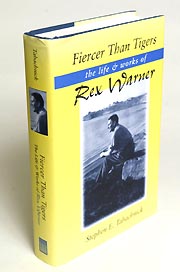|
This is an archived article.
For the latest news, go to the
Advance Homepage
For more archives, go to the Advance Archive/Search Page. | |
|
Alumnus Becomes Biographer Of
"Rex Warner was one of the very few people in America who could handle that," said Tabachnick, who completed his doctoral work in 1971 and is now chair of the English Department at the University of Memphis. "That's why I came to the University of Connecticut." Warner, a historical novelist and the accomplished translator of Greek and Roman texts who died in 1986, taught in UConn's English Department from 1963 to 1974. He is the subject of Tabachnick's latest book, Fiercer Than Tigers: The Life and Works of Rex Warner (Michigan State University Press, 2002). In the 1930s and 1940s, Warner - who grew up in England and was a contemporary of poets W.H. Auden and C. Day Lewis as a student at Oxford University - was considered a literary legend whose works were powerful reflections on the political issues of the time. The Aerodrome (1941), for example, was a fictional work that explored the dangerous appeal of fascism. He was the author of historical novels such as The Young Caesar (1958) and Imperial Caesar (1960). And he also made his mark as the translator of the ancient Greek historian Thucydides' work, The Peloponnesian War - the translation sold nearly one million copies - and as the translator of the Greek poet George Seferis, who won the Nobel Prize in 1963. Tabachnick says he was initially reluctant to become the biographer of his teacher and friend, but was persuaded to tackle the job by his wife, Sharon. "It was such a vast job. Rex had done an enormous amount of writing," he says. "Because I was so worried I wouldn't be able to do it, I went about it in a very obsessive way." Tabachnick's previous books, about Lawrence and the author-traveler Charles Doughty, were studies rather than biographies. He made a key decision in writing about Warner: It would be a life-and-works instead of a life-and-times treatment. "There is an important distinction," he says. "With most life-and-times books, what you have is a subject and not enough primary material, so you fill in with what life was like during the subject's time. In this case the amount of material was enough. When you have a vast amount of primary stuff and nobody has looked at it before, you're obligated to look at it all." Warner's widow, Frances, provided the author with access to manuscripts and other works and he also returned to the Storrs campus, which holds a collection of manuscripts donated by Warner in 1969. Tabachnick says writing a biography of the professor with whom he worked for two years gave him an opportunity to see a much fuller person. "It's like a window opening fully after you've had the shade down halfway," he says. He says one of the surprises in writing Fiercer Than Tigers was learning more about Warner's personal life and history, including his experiences in England during the Blitz period of World War II; his political views - he was a Marxist sympathizer; and his three marriages - he divorced his wife Frances, got married again, and later remarried his first wife. He says he was amazed by Warner's extensive knowledge of world events. "I had an inkling, but I never wanted to question him," he says. "You wouldn't want to do that to your doctoral advisor. My admiration for him has grown." Tabachnick describes the English department in Storrs at the time he did his doctoral work as "a very lively place. It brought in creative people and gave students a lot of freedom of choice." As part of his research for the biography, Tabachnick interviewed faculty and staff who knew Warner. In the book, he describes Warner's 11 years at UConn as "among the best in his life both professionally and personally É Rex found himself among an appreciative community of scholars and students." In addition to Warner, the highly regarded English department included at that time the poet and biographer John Malcolm Brinnin, the poets Stephen Spender and Charles Olson, the scholar of modern literature Joseph Cary, the romanticist Jack Davis, and Stephen Crane's biographer, R.W. Stallman. For his next project, Tabachnick plans to write an encyclopedia of Lawrence of Arabia. |
 hen Stephen
Tabachnick was deciding where to pursue his doctoral studies, he
knew that he needed a special individual to guide him. He planned
to write a dissertation on T.E. Lawrence, better known as Lawrence
of Arabia, and the young scholar felt he needed a mentor with a
wealth of literary experience, knowledge of world events, and
insight into how to tackle a complicated historical figure.
hen Stephen
Tabachnick was deciding where to pursue his doctoral studies, he
knew that he needed a special individual to guide him. He planned
to write a dissertation on T.E. Lawrence, better known as Lawrence
of Arabia, and the young scholar felt he needed a mentor with a
wealth of literary experience, knowledge of world events, and
insight into how to tackle a complicated historical figure.
